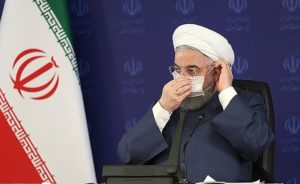The Iran Deal May Still Be Dead

By Tasnim News Agency, CC BY 4.0, https://commons.wikimedia.org/w/index.php?curid=92598833
‘No deal is better than a bad deal,” then-Secretary of State John Kerry opined during nuclear negotiations for the Obama administration with Iran before ultimately clinching the Joint Comprehensive Plan of Action in 2015. Now, as discussions about returning to the JCPOA drag on, President Biden should prepare for a no-deal outcome.
Whether supportive of President Obama’s agreement or President Trump’s withdrawal from it in 2018, many assumed Tehran would rejoin some version of the deal, driven by a desire for economic benefits or diplomatic cooperation.
Yet getting back into the original agreement was never going to be so easy. Iran’s nuclear program has advanced much further than the JCPOA accounted for. The original deal has no provisions regarding Iran’s extra enrichment and centrifuge manufacturing facilities, nor the irreversible know-how Iranian scientists have gathered from operating advanced centrifuges in violation of the deal.
“The Iranian program has grown, become more sophisticated,” Rafael Grossi, head of the International Atomic Energy Agency, warned last month. “Linear return to 2015 is no longer possible.” Tehran’s continued stonewalling of investigations into its nuclear weapons work will, “at a minimum, severely complicate” returning to the JCPOA, in the words of the Biden administration. Iran also insists it should be allowed to continue using advanced centrifuges for nuclear enrichment, well beyond what the JCPOA permitted. But the White House wants these machines destroyed.
Meanwhile, the U.S. has expanded its sanctions on Iran’s vital banking and energy sectors, as well as its Islamic Revolutionary Guard Corps. These entities would remain blacklisted for ties to terrorism even if Washington lifts all the JCPOA’s nuclear-related sanctions. The Biden administration’s position that many U.S. sanctions—hundreds, according to Secretary of State Antony Blinken —will remain on the books is irreconcilable with Iran’s demand for total economic relief before rolling back its nuclear breaches.
It’s not surprising, therefore, that six rounds of deliberations in Vienna have been inconclusive. “It remains unclear whether Iran is willing and prepared to do what it needs to do to come back into compliance,” Mr. Blinken told the House Foreign Affairs Committee this month. Mr. Blinken’s top deputy and a key negotiator for the U.S., Wendy Sherman, said days later that “until the last detail is nailed down, and I mean nailed down, we will not know if we have an agreement.”
Even if both governments nail those details down, they may not stay that way. The winner of the June 18 Iranian presidential election, Ebrahim Raisi, is a hard-liner skeptical of the deal. He’ll assume office in early August and has already said he won’t meet with Mr. Biden even if an agreement is struck. In Washington the Democratic majority is slim enough that Congress could review and effectively block JCPOA re-entry.
To prepare for the looming possibility of a no-deal future, the Biden administration should start by reiterating Mr. Obama’s 2009 pledge that the White House will “use all elements of American power to prevent Iran from developing a nuclear weapon.” Specifically, the administration should convey unmistakably its readiness to use military options if necessary to stop Tehran from producing enough highly enriched uranium for a nuclear weapon.
The Pentagon can bolster the credibility of such statements with updated contingency plans and force deployments for neutralizing Iran’s nuclear facilities. This could include deploying Massive Ordnance Penetrator munitions and strategic bombers to the British territory Diego Garcia in the Indian Ocean, as well as boosting the U.S. Navy’s carrier and missile-defense presence in the Persian Gulf and Arabian Sea as part of a general strengthening of America’s global force posture and broader increase in defense spending. Military exercises with these capabilities, and strategic communications to publicize them, would help prove the seriousness of Washington’s intentions.
Given its diminishing presence in the region, America should also make clear that it backs Israel if it takes military action in self-defense against Iran, doubling down on the Biden administration’s recent support for the Jewish state’s freedom of action. Since July 2020 Israel’s covert strikes have taken thousands of centrifuges off line and set back Tehran’s mass-production of advanced centrifuges, delaying its breakout time. Building on the welcome replenishment of Israel’s Iron Dome interceptors, Washington should also ensure Jerusalem has adequate precision-guided munitions to prevent a nuclear Iran and deter, or if necessary prevail against, reprisals from Tehran and Hezbollah.
It may not be what Mr. Biden wanted, but these steps are likely the best way to prevent a nuclear Iran, or a bad deal that enables it.
Messrs. Misztal and Ruhe are, respectively, vice president for policy and director of foreign policy at the Jewish Institute for National Security of America.
Originally published in The Wall Street Journal